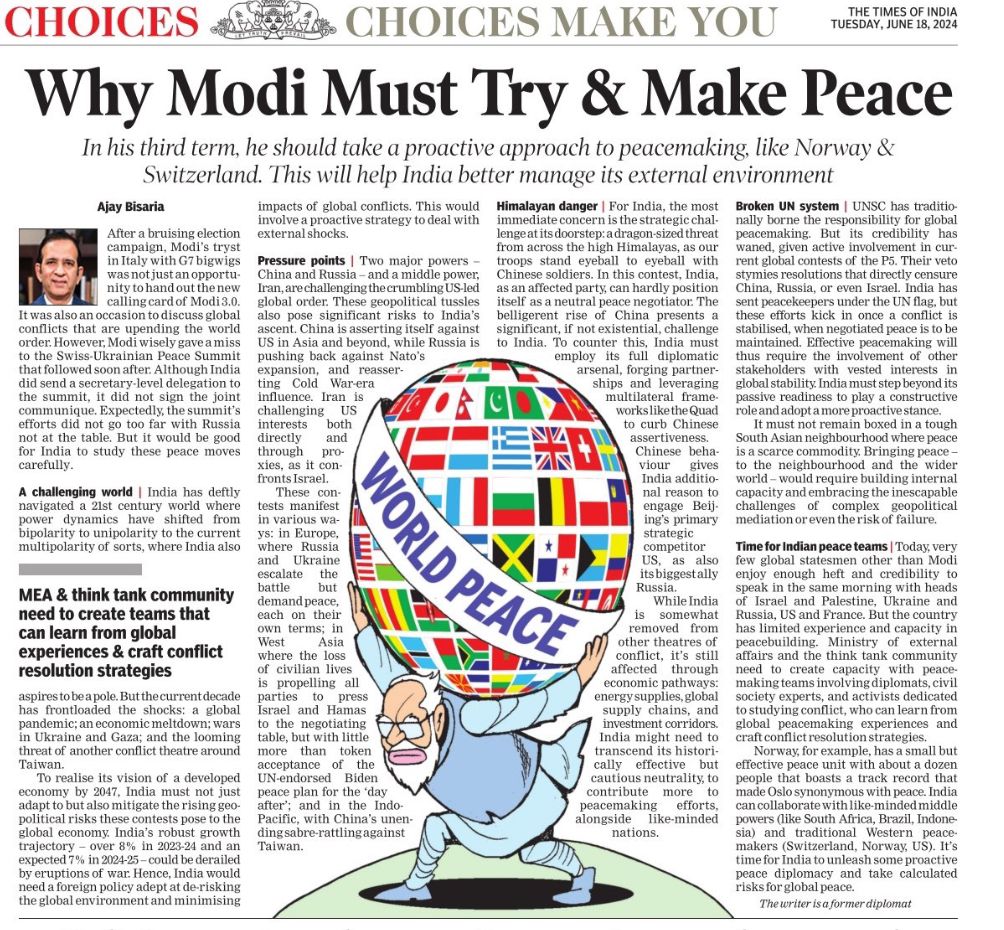The Assam Tribune: India should adopt two-pronged strategy to deal with Pakistan, says ex-envoy Bisaria
India should adopt a two-pronged strategy to deal with Pakistan-military action against terrorism together with calibrated diplomatic moves, former Indian High Commissioner to Pakistan, Ajay Bisaria said. In an interview with The Assam Tribune, Bisaria also expressed the view that Pakistan would continue to harbour terrorists, at least for some time to come. Following are […]
Sindoor’s New Red Line
Pakistan, by contrast, embraces external involvement. It needs the optics. It declares every Western phone call a validation of its global stature, just as it rebrands military defeats as victories. The Pakistani military’s propaganda wing, ISPR, will undoubtedly package Op Bunyan Ul Marsoos as an unqualified victory —short war, operational brilliance, and international attention.
The same logic was deployed to claim triumph in 1965, 1971, and 1999, each a setback to Pakistan’s army. What really matters is control of the domestic narrative.
As India celebrates Op Sindoor, a robust debate will take place on strategic choices and operational success. Across the border, Pakistan will project its army chief, General Asim Munir, as a victor. He will expect that this limited conflict has bolstered his authority. It plays into long-standing paranoia about India, casting the army as the nation’s sole saviour.
India has now made a doctrinal pivot in its fight against terrorism. India does not need war—or passive restraint. It has delivered a credible, coercive slap against terrorism. But will that prevent the next Pahalgam? Will it make Pakistan rethink the costs of using terrorism as strategy? For India, deterrence is not about spectacle. It has reshaped the adversary’s calculus.
The Economist: India and Pakistan are bracing for a military clash
During the last big military stand-off between India and Pakistan, in 2019, Mike Pompeo was woken by an urgent call at his hotel in Hanoi. Mr Pompeo, who was then America’s secretary of state, described in a memoir being connected to an Indian minister who said Pakistan was preparing a nuclear strike on India. Mr Pompeo […]
Managing a Tough Neighbourhood
India’s neighbourhood policy demands strategic patience, embracing occasional anti-India regimes, navigating Chinese competition, and rejecting zero-sum approaches. A durable framework for regional security and prosperity should prioritize grants over loans, emphasizing economic and security cooperation, connectivity, and humanitarian assistance. Engagement spans energy collaboration, development aid, defence partnerships, disaster relief, cultural exchanges, and infrastructure projects. Encouraging Quad partners like the U.S., Japan, and Australia to join South Asia’s economic initiatives will enhance regional stability, despite occasional differences. Reviving SAARC will offer a more manageable mechanism for dialogue, complementing sub-regional platforms like BIMSTEC and BBIN, while reducing reliance on the China-led SCO.
Book Excerpt: Massacre in Mumbai
President Zardari called PM Manmohan Singh on the morning of 27 November to condemn the attacks and surprisingly, promised to send the DG of the ISI, Shuja Pasha, to help in the investigation. On the evening of 27 November, just before Qureshi addressed a group of journalists at the Women’s Press Club in New Delhi, Shahid Malik’s phone buzzed.
Dealing with Pakistan: India’s Western Neighbour is No Longer a Strategic Priority
India’s Pakistan policy has evolved over the last decade, from an attempted rapprochement in 2014-15, to a focus on stringent border management and counterterrorism. Even though India’s primary strategic challenge over the next decade would emanate from the north i.e. China- the country’s most recalcitrant western neighbour will continue to pose a sub-conventional security threat.
Book Excerpt: A troubled Flight IC 814
As the ‘VIP carcade’ sped towards RCR, I spoke to Anand and then breathlessly told the prime minister that an Indian Airlines flight from Nepal had been hijacked and had landed at Amritsar airport; the crisis management group led by the cabinet secretary was in session and (the principal secretary) Brajesh Mishra was waiting at RCR to brief the prime minister on unfolding events.
RT TV: Let’s Talk Bharat with Anupam Kher
“The US-centered world has ended, in the new multipolar world order, India seeks a greater role.” -Ajay Bisaria Anupam Kher interviews former diplomat Ajay Bisaria, India’s last High Commissioner to Pakistan, who reflects on his tenure in the neighboring country and discusses what he believes to be the most significant issue in the often tense […]
‘Strategic realism’ with ‘economic pragmatism’ — a former diplomat on ‘creative’ economic diplomacy
In fact, the larger framework for economic diplomacy should seek to balance commercial outreach with broader strategic foreign policy aims. Diplomats have moved from promoting trade agreements to more innovative means of dealing with a world in flux. The traditional instruments of promoting investment, exports and tourism have to be supplemented with additional pathways for achieving the national interest.
Why Modi must try & make peace

The planetary turmoil is not new. India has deftly navigated a world where power dynamics have shifted from bipolarity to unipolarity to the current multipolarity of sorts, where India also aspires to be a pole. But the current decade has frontloaded the shocks: a global pandemic; an economic meltdown; wars in Ukraine and Gaza; and the looming threat of another conflict theatre around Taiwan.